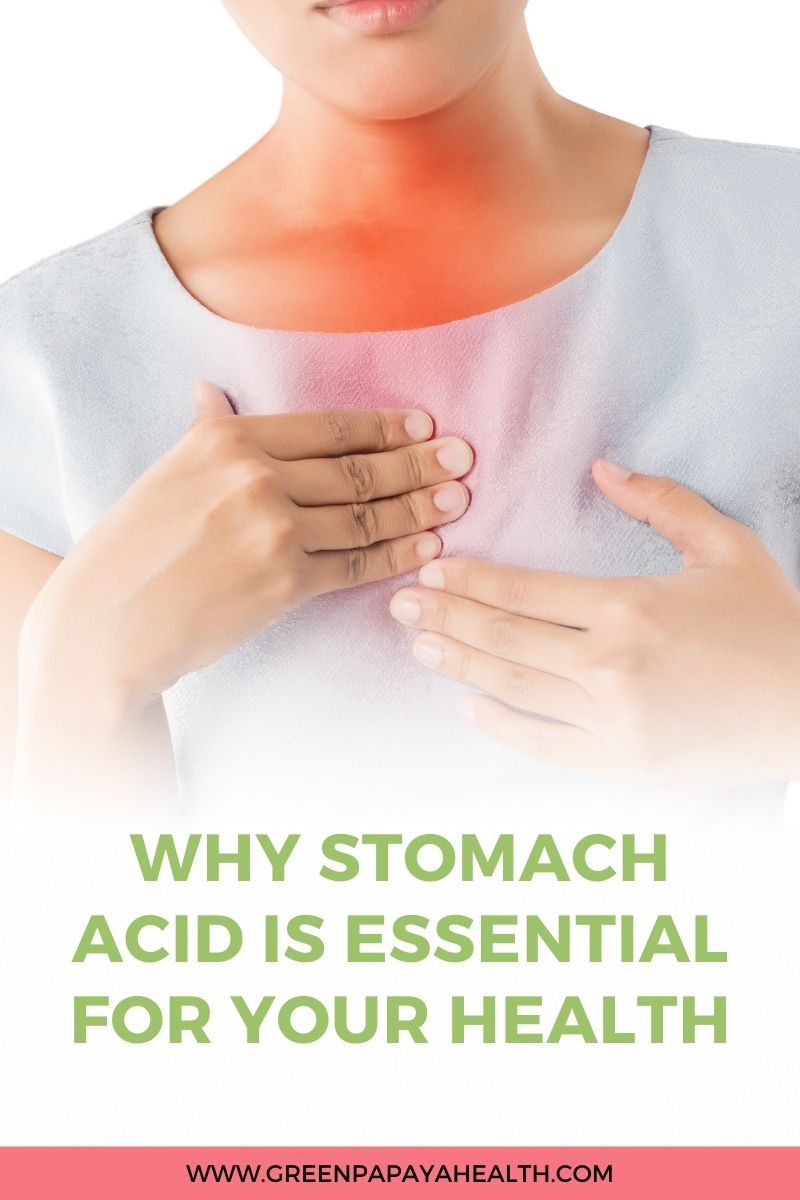Stomach acid is good for you – but is often impaired! Normally, a healthy stomach creates a helpful and necessary, strongly acidic environment with a pH of between 1.0 and 2.5. However, there are many modern lifestyle dynamics that can lead to a lowered production of stomach acid. In particular, sustained stress or suboptimal thyroid function are both quite common and can lead to a reduction in stomach acid secretion. There are also autoimmune dynamics that can directly impair acid production.
Acid Reducing Dynamics
As we grow older, however, the primary dynamic that decreases stomach acid production is a gastric infection of a bacteria called Helicobacter Pylori (or H.Pylori, for short). These bacteria are endemic to the human gut, but they can overgrow in a “simmering” infection in the background and affect us for decades. With the right perfect storm of factors, this infection can become acute and cause an ulcer. A simmering H pylori infection is often responsible for a progressive reduction in stomach acid as we age. H pylori overgrowth is more common when we have lower stomach acid, and once well established, the bacteria further suppress stomach acid in order to make their home more hospitable. It is estimated that a full 50% of people aged 60 or older produce insufficient stomach acid. By age 85, this percentage increases to 80%! Regardless of the root causes, we call this dis-ease state hypochlorhydria – and it can far-reaching impact that is seldom acknowledged in conventional medicine.
To make matters worse, our modern society frequently uses acid-suppressing medications which reduce gastric juice acidity on purpose – dramatically – to bring relief from acid reflux (GERD). These drugs most often include the powerful proton pump inhibitors or PPIs (e.g. Nexium®, Prilosec®) and the less aggressive H2 receptor blockers (e.g. Zantac®, Pepcid®). Typical “painkiller” NSAID medications(e.g. aspirin, ibuprofen such as Advil®, Motrin®) can also impair stomach acid production and damage the lining of the stomach. Antibiotic use may also reduce stomach acid. All of these medications may bring important, triage relief for various medical conditions. Ongoing use, however, may have dramatic downstream consequences, especially for PPIs. If you have an ulcer or gastritis, stomach acid inhibition can be particularly beneficial in the short term, but long term, we lose the ability to absorb optimal nutrition from our food. After all, it’s not so much that “we are what we eat”; actually, we are what we Eat, Digest, and Absorb!
We need strong stomach acid for optimal digestion. In the stomach, we denature proteins to ensure optimal absorption of amino acids in the intestines, prepare Vitamin B12 so it can be absorbed at all, and separate tightly-bound minerals to allow for intestinal uptake (e.g. iron, magnesium, chromium, zinc). When stomach pH becomes less acidic (that is, more alkaline) it also inhibits the action of pepsin, a critical protein-digesting enzyme in the stomach. Plus, strong stomach acid helps to ensure an overall optimal pH in our intestines which (1) ensures optimal release of both pancreatic and gallbladder digestive fluids and (2) allows digestive enzymes to work at their peak effectiveness.
Hypochlorhydria has been associated with many common health problems. Adequate HCI is necessary for denaturing proteins to allow optimal amino acid availability such as is needed for hormone and neurotransmitter synthesis. B12 deficiency may cause cognitive impairment, fatigue/weakness, impaired methylation/detoxification, neuropathy, and other nervous system problems. Insufficient mineral absorption can lead to a myriad of disease states in the body from anemia to type 2 diabetes, autoimmune diseases, arthritis, depression, hypothyroidism, and more.
Symptoms
There are many common symptoms of hypochlorhydria, and a given individual may only suffer from a few of these (and the effects might be intermittent):
- Feeling nauseated after taking supplements (except zinc which may promote nausea on its own)
- Clearly seeing undigested food in stools
- Upper GI bloating, belching, and/or an early sense of satiety during or right after meals
- Irritable bowel syndrome (IBS) or frequent gut infection or microbial imbalance (e.g. candida, parasite)
- Feeling particularly fatigued after meals (especially if a meal was otherwise consumed slowly)
- Insufficient levels of Vitamin B12 and/or iron despite eating a carnivorous diet
- Hair or nails that break frequently or are thin
- Chronic allergy or urticaria
- Multiple mineral deficiencies despite a whole foods diet (e.g. zinc, magnesium, chromium, copper)
- Rosacea
- Osteoporosis or advanced osteopenia
- Multiple food allergies or sensitivities
- Asthma, especially if wheezing is also involved
- Chronic indigestion or GERD
Considerations
How do you figure out if you have low stomach acid? The goal is to give the body an opportunity to experiment with increased stomach acidity and communicate by its reaction whether the support is needed and, if so, how much is optimal at this time. Stomach acidity supplementation can be a very beneficial choice while you are working with your healthcare practitioner to address the upstream root causes of the deficiency.
Individuals who have had insufficient stomach acid for some time often have had a thinning of the protective mucosal lining of the stomach. Talk to your healthcare practitioner about your unique circumstances. You may need to support the repair and build-up of this protective barrier before increasing stomach acidity. This is especially true of individuals who have been using acid-suppressing medication (and especially PPIs). Insufficient stomach acid is a growing health issue, but it is relatively easy to reverse with a low stomach acid experiment.
If you think you have low stomach acid, reach out for a FREE discovery call today and we can get you on the right track!






